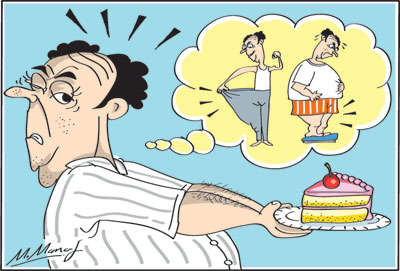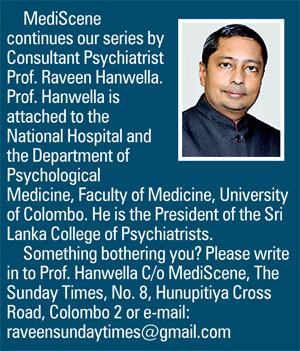‘I will’, ‘I won’t’, and ‘I want’; willpower in a nutshell
View(s):Then Jesus was led by the Spirit into the wilderness to be tempted by the devil. After fasting forty days and forty nights, he was hungry. The tempter came to him and said, “If you are the Son of God, tell these stones to become bread.”
 Matthew 4:1-3 New International Version (NIV)
Matthew 4:1-3 New International Version (NIV)
Like Jesus, we too are tempted every day of our lives. Perhaps our temptations are more mundane, but the inability to resist temptation can seriously harm our lives.
To take an example from my practice, those who consult me have diverse psychiatric problems, but there is one thing they can do which will benefit them all. That single most important thing is exercise. Physical exercise has numerous benefits, and the Mayo Clinic lists seven of them. They are weight control, combating diseases such as diabetes, hypertension, arthritis and even cancer, improving mood, boosting energy levels, promoting sleep, enhancing libido and, helping in socialising. To get optimum benefits, you should aim for 150 minutes of moderate intensity exercise or 75 minutes of high-intensity exercise per week. Even with all these benefits, only a minority of my patients are able to start and maintain a regular programme of exercise.
It is not easy to change a lifestyle or habit even though it may be good for you. One important ingredient in change is willpower. One definition of willpower is the ability to resist temptation, but there are other aspects to the concept. The Miriam Webster dictionary defines willpower as the ability to control yourself: a strong determination that allows you to do something difficult (such as to lose weight or quit smoking). The American Psychological Association defines willpower as: the ability to delay gratification, resisting short-term temptations to meet long-term goals, the capacity to override an unwanted thought, feeling or impulse, conscious, effortful regulation of the self by the self and, a limited resource capable of being depleted.
 Is willpower an inherent character trait? Is it something you are born with or is it something you can cultivate?
Is willpower an inherent character trait? Is it something you are born with or is it something you can cultivate?
One of the earliest studies on willpower is the Marshmallow Test of Stanford psychologist Walter Mischel. In the early 1960s, he studied a group of children attending the Stanford University Nursery School. Mischel gave the children a choice between one treat (such as a marshmallow or pretzel) which they could have immediately or two treats (two marshmallows or pretzels) if they were willing to wait with the treat in front of them for up to 20 minutes. Only one third were able to resist and get their reward of two treats. Though Mischel published his results, few took notice. The results were interesting but not earth-shattering and would have remained unnoticed if not for a fortuitous event some years later. Mischel’s daughters happened to attend the same school in Stanford, and he heard from them that the children who failed the Marshmallow Test appeared to be having more problems than those who delayed gratification. Mischel and his colleagues tracked down as many children as possible from the original experiment. What they found was striking. The children who qualified for the second treat scored 210 points higher on their SAT scores and were more popular with their peers and teachers. They even had a lower body mass index suggesting that they were better able to resist overeating. Later in life, they earned higher salaries and reported fewer problems with drug abuse. All these benefits were the result of one factor, the ability of self-control.
Self-control is an important component of willpower. According to Kelly McGonigal, another psychologist from Stanford, saying no is one part of willpower, saying yes is also important sometimes. When you put off doing important things willpower helps you put them on the ‘do today’ list. ‘I will not’, and ‘I will’ are two aspects of willpower, but the two alone are not sufficient. To say no or yes when you need to a third factor is necessary, the ability to remember what you actually want. For example, when faced with the temptation of a tasty chocolate cake it is important to remember what you really want (stay slim, reduce your weight or keep your blood sugar under control). These three things, ‘I will’, ‘I won’t’, and ‘I want’ are the essential ingredients of willpower.
Psychologist Roy Baumeister who has researched this elusive quality called willpower for years sums up his findings in his book Willpower: Rediscovering the Greatest Human Strength. In experiments that started in the late 90’s Baumeister and his colleagues showed that willpower like a muscle can get fatigued. In their classic Chocolates and Radishes experiment, a group of students were exposed to the delicious smell and sight of chocolate cookies. Some students in the group were allowed to taste the cookies while the others were given a plate of radishes instead. The students were then asked to complete a set of complicated puzzles. The radish-eating students performed badly compared to those who were able to taste the cookies. The students who were forced to resist the sweets had depleted their reserves of willpower and were unable to summon sufficient reserves to undertake another difficult task.
Baumeister also showed that our blood sugar levels and whether we have slept a sufficient amount of time influence willpower. If we are hungry and sugar depleted or sleep deprived our willpower is also impaired. Baumeister refers to a study done in Israeli prisons where prisoners had a 70 percent chance of getting parole if they appeared before the parole board after lunch, and only a 15 percent chance if they appeared immediately before.
Getting a good night’s sleep and making important decisions after you have eaten well are important for maximising your willpower. Baumeister also found that we use the same reservoir of willpower for everything. There is no separate willpower for exercise, dieting, work or dealing with people. When you exert self-control, you draw on the same source of energy. So, keep your willpower reserves for the important decisions in your day.
The good news is that willpower is like any other skill and could be improved with practice. Here are a few strategies from Baumeister for developing your willpower. Adjust your posture every time you realise you are slouching. Try using your non-dominant hand for tasks such as opening doors or picking up things. Since our brains are wired for using the dominant hand, using the other hand requires conscious effort or willpower. Stop using swear words (even silently). This goes against your natural inclination in a stressful situation. Track your spending. This is not something we normally do, but the discipline of monitoring your finances will increase willpower and, in the process, you will also learn to manage your money better.
A simple but effective strategy to increase willpower is to spend a little time on neatness. An orderly desk or room subtly influences your brain and your behaviour making it less of a strain to maintain self-discipline.
Willpower is depleted when you have to respond to emergencies. Service your car regularly without waiting for it to break down. Give yourself enough time to finish a project or study for an examination. Don’t wait till the last moment. Rather than wait for a crisis, develop effective habits and establish routines for healthy behaviours such as exercise. Initially, these require willpower but once established they will happen automatically and without much effort.
Next month I will write in detail on how you can establish healthy habits and routines.


